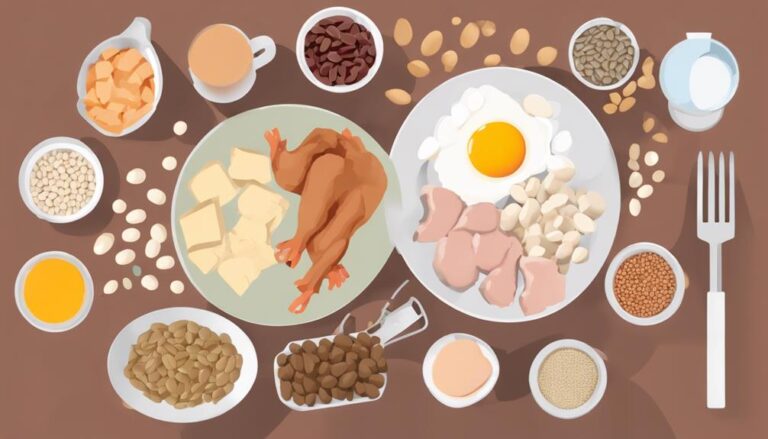What Are Healthy Ways to Gain Weight and Muscle?
If you've ever felt like your efforts at the gym aren't yielding the muscle gains you desire, there may be some key aspects you're overlooking.
When it comes to achieving a healthy weight and building muscle, it's crucial to consider not just the workouts you perform but also what you fuel your body with.
By focusing on specific nutrition strategies, exercise routines, and lifestyle habits, you can optimize your muscle-building potential.
Let's explore some effective approaches that can help you reach your goals and transform your physique in a sustainable manner.
Key Takeaways
- Maintain a balanced diet rich in protein, vitamins, and minerals for muscle growth.
- Engage in proper strength training techniques and compound movements for muscle development.
- Monitor protein intake and caloric balance to support muscle repair and growth.
- Strategically time meals and focus on progress tracking to optimize weight gain and muscle-building results.
Proper Nutrition for Muscle Growth
To maximize muscle growth, ensure your diet is rich in protein, essential vitamins, and minerals. Nutrient timing plays a crucial role in supporting muscle development. Consuming protein-rich foods such as lean meats, eggs, dairy, legumes, and nuts within 30 minutes to an hour after your workout can help repair and build muscle tissue more effectively. Additionally, spreading your protein intake evenly throughout the day can aid in muscle protein synthesis.
Macronutrient balance is another key aspect of proper nutrition for muscle growth. A balanced diet that includes carbohydrates, proteins, and fats in the right proportions is essential. Carbohydrates provide the energy needed for intense workouts, while proteins help with muscle repair and growth. Healthy fats support hormone production and overall health.
Strive to include a variety of nutrient-dense foods in your meals to ensure you're getting all the necessary vitamins and minerals for optimal muscle growth. Remember, consistency in your dietary habits is key to seeing progress in your muscle-building journey.
Effective Strength Training Exercises
To build muscle effectively, incorporating key muscle-building workouts and utilizing proper strength training techniques is essential.
By engaging in compound movements like squats, deadlifts, and bench presses, you can target multiple muscle groups simultaneously, maximizing your gains.
Additionally, focusing on progressive overload, gradually increasing the weight or resistance you lift, will help stimulate muscle growth and strength development.
Key Muscle-Building Workouts
For effective muscle-building and strength training, incorporating key exercises into your workout routine is essential. Alongside focusing on muscle-building nutrition and recovery strategies, it's important to include exercises that target major muscle groups.
Compound movements like squats, deadlifts, bench presses, and pull-ups are excellent choices as they work multiple muscles simultaneously, promoting efficient muscle growth. Additionally, incorporating muscle gain supplements and optimizing your workout recovery through proper rest and sleep are crucial for maximizing muscle-building potential.
Remember to progressively increase the intensity of your workouts to continue challenging your muscles and stimulating growth. By consistently performing key muscle-building exercises and supporting your body with adequate nutrition and recovery, you can achieve your goals of gaining weight and muscle effectively.
Strength Training Techniques
Incorporate effective strength training exercises that target specific muscle groups to enhance your muscle-building efforts and overall strength gains. To maximize your progress, consider the following tips:
- Progressive Overload: Continuously challenge your muscles by gradually increasing the weight or resistance you use during your workouts.
- Recovery Strategies: Allow for adequate rest between training sessions to promote muscle repair and growth.
- Muscle Hypertrophy: Focus on exercises that stimulate muscle growth, such as squats, deadlifts, and bench presses.
- Muscle Endurance: Incorporate high-repetition sets or circuit training to improve your muscles' endurance capacity.
- Variety: Rotate between different exercises to target muscles from various angles and prevent plateaus in your progress.
Adequate Protein Intake
Ensuring you consume enough protein daily is essential for supporting muscle growth and repair. Protein sources such as lean meats, poultry, fish, eggs, dairy products, legumes, nuts, and seeds are crucial for providing your body with the necessary building blocks to repair and build muscle tissue.
When you engage in strength training or other forms of exercise, your muscles undergo stress and micro-tears. Adequate protein intake aids in repairing these micro-tears, promoting muscle growth, strength, and recovery.
To optimize muscle repair, aim to include a source of protein in each meal and snack throughout the day. This consistent intake ensures that your muscles have a steady supply of amino acids for repair and growth. Additionally, consuming protein within an hour after your workout can further support muscle recovery by providing immediate nutrients when your muscles need them the most.
Importance of Rest and Recovery
To maximize muscle growth and overall performance, understanding the importance of rest and recovery is crucial. When aiming to gain weight and muscle, giving your body time to recover and rebuild is just as important as the time spent working out.
Here are some key points to consider:
- Sleep Quality: Adequate sleep is essential for muscle recovery and growth. Aim for 7-9 hours of quality sleep per night.
- Stress Management: High stress levels can negatively impact recovery. Implement stress-reducing activities such as meditation or yoga.
- Recovery Strategies: Incorporate active recovery techniques like light stretching, foam rolling, or low-intensity activities on rest days.
- Active Rest: Engage in activities like walking or swimming on rest days to promote blood flow and aid in muscle recovery.
- Listen to Your Body: Pay attention to your body's signals. If you're feeling overly fatigued or sore, take an extra rest day to prevent injury and promote recovery.
Incorporating Healthy Fats in Diet
A balanced approach to your diet includes incorporating healthy fats to support your weight and muscle gain goals. Healthy fats, such as those found in avocados, nuts, seeds, and olive oil, offer numerous benefits for overall health and fitness. These fats provide a concentrated source of energy, essential fatty acids, and help in the absorption of fat-soluble vitamins like A, D, E, and K. Including healthy fats in your diet also aids in hormone production, which is crucial for muscle growth and repair.
To ensure a balanced diet essential for weight and muscle gain, aim to include sources of healthy fats in each meal. You can add sliced avocado to your sandwich, sprinkle nuts and seeds on salads or yogurt, and use olive oil for cooking or as a dressing. Remember, moderation is key, as fats are calorie-dense. By incorporating healthy fats into your meals, you can optimize your nutrition intake and support your muscle-building efforts effectively.
Hydration and Muscle Building
In your journey towards gaining weight and muscle, understanding the crucial role of hydration in supporting muscle building is essential. Proper hydration is vital for muscle growth and overall health.
Here are some hydration strategies to optimize muscle building:
- Consistent Water Intake: Ensure you drink an adequate amount of water throughout the day to support muscle function and recovery.
- Electrolyte Balance: Maintain a balance of electrolytes like sodium, potassium, and magnesium to support muscle contractions and prevent cramping.
- Pre-Workout Hydration: Drink water before your workout to stay hydrated during exercise and enhance performance.
- Post-Workout Rehydration: Replenish fluids lost during exercise by consuming water after your workout to support muscle recovery.
- Monitor Urine Color: Check the color of your urine; a pale yellow color indicates proper hydration levels.
Monitoring Caloric Intake
Ensuring you consume an appropriate amount of calories is crucial for supporting muscle growth and weight gain in a healthy manner. To promote muscle gain, you need to be in a caloric surplus, meaning you're consuming more calories than your body expends. This surplus provides the extra energy needed for muscle repair and growth. When monitoring your caloric intake, focus on incorporating nutrient-dense foods, especially protein sources. Proteins are essential for muscle development and repair. Include lean meats, poultry, fish, eggs, dairy, legumes, nuts, and seeds in your diet to meet your protein requirements.
Tracking your caloric intake can be beneficial to ensure you're consistently consuming enough calories to support muscle growth. However, remember that the quality of calories matters just as much as the quantity. Opt for whole foods that are rich in nutrients to fuel your body effectively. By paying attention to your caloric intake and choosing the right foods, you can support your muscle-building goals in a sustainable and healthy way.
Meal Timing for Muscle Gain
When it comes to gaining muscle efficiently, the timing of your meals plays a crucial role.
Optimal meal frequency, including pre and post-workout meals, can significantly impact muscle growth.
Understanding the importance of timing your meals can help maximize your muscle gain potential.
Optimal Meal Frequency
For optimal muscle gain, consider strategically spacing out your meals throughout the day to support your body's protein synthesis and energy needs. Meal planning and consistency play a vital role in ensuring you meet your daily caloric and macronutrient requirements. Nutrient timing is crucial for optimizing muscle protein synthesis and overall metabolism. Here are some tips to help you with your optimal meal frequency:
- Aim to eat every 3-4 hours to keep a consistent flow of nutrients.
- Include a source of protein in each meal to support muscle repair and growth.
- Prioritize complex carbohydrates like whole grains and vegetables for sustained energy levels.
- Incorporate healthy fats such as nuts, seeds, and avocados to support hormone production.
- Stay hydrated throughout the day to aid digestion and nutrient absorption.
Pre and Post-Workout Meals
To optimize muscle growth and recovery, strategically timing your pre and post-workout meals can significantly impact your overall muscle gain progress.
Pre-workout snacks rich in carbohydrates and protein can provide the energy needed for your workout. Consider options like a banana with almond butter or Greek yogurt with granola.
After your workout, focus on post-workout nutrition to support muscle recovery. Protein-rich foods like chicken, tofu, or protein shakes can aid in muscle repair and growth. Additionally, incorporating muscle-building supplements like creatine or whey protein can enhance your results.
Importance of Timing
Timing your meals strategically is crucial for maximizing muscle gain and optimizing your workout results. Proper meal timing plays a significant role in supporting muscle growth and aiding in weight gain. Here are some essential points to consider when it comes to meal timing for muscle gain:
- Pre-Workout Nutrition: Consuming a balanced meal 2-3 hours before your workout can provide the necessary energy for optimal performance.
- Post-Workout Nutrition: Refuel your body within 30 minutes after exercise to aid in muscle recovery and growth.
- Protein Intake: Distribute protein intake evenly throughout the day to support muscle protein synthesis.
- Carbohydrates: Consuming carbohydrates before and after workouts can help replenish glycogen stores and support muscle recovery.
- Consistency: Aim for consistency in meal timing to maintain steady energy levels and support muscle building.
Tracking Progress and Adjustments
Monitoring your progress and making necessary adjustments is crucial in your journey to gaining weight and building muscle. Tracking your progress allows you to see what is working well and where modifications may be needed to continue making gains effectively. Whether you are focusing on weight gain strategies or muscle building, keeping tabs on your results will help you stay on track towards your goals. Here is a table to help you track your progress and make adjustments accordingly:
| Progress Tracking | Indicators | Adjustments |
|---|---|---|
| Weight Gain | Scale measurements | Increase caloric intake or adjust macronutrient ratios |
| Muscle Building | Strength levels | Modify workout intensity or frequency |
| Dietary Intake | Food log analysis | Fine-tune meal planning for optimal nutrition |
| Body Measurements | Body fat percentage | Adjust cardio and resistance training balance |
| Energy Levels | Daily performance | Evaluate rest and recovery strategies |
Use this table to monitor your progress diligently and make informed adjustments to your weight gain and muscle-building journey.
Conclusion
In conclusion, remember that gaining weight and muscle in a healthy way requires a balanced approach. By focusing on:
- Proper nutrition
- Effective strength training
- Adequate protein intake
- Rest and recovery
- Healthy fats
- Hydration
- Monitoring caloric intake
- Meal timing
- Tracking progress
You can achieve your muscle-building goals. Consistency is key, so stay committed and celebrate your progress along the way.
Embrace the journey to a stronger, healthier you!







